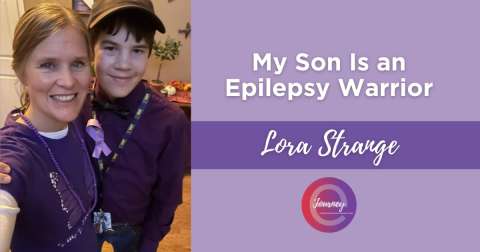My Son Is an Epilepsy Warrior

By Lora Strange , Idaho
Parent of a Child with EpilepsyWednesday, June 26, 2024
My son, the second of four boys, was a very healthy child who led a very typical life. He was active in school, had a lot of friends, and he was hardly ever sick. In first grade, he suddenly developed a series of seemingly typical childhood ailments such as a cold, strep throat, and stomach bugs, one right after the other. With the last illness, he had a fever for five days, after which he started suddenly having tonic-clonic seizures. They couldn’t be stopped at the hospital, so he ended up being placed in a medically induced coma.
Most of his testing, including an MRI, came back normal. The only thing that wasn’t normal was the EEG, which showed slow spiking due to some type of encephalopathy, but there was nothing to indicate a cause. As he woke from his coma, he displayed psychosis and still suffered from seizures. He was in the hospital for a month, until it was decided that he might have a type of autoimmune encephalitis, and he was treated with steroids and an anti-seizure medication. The seizures were stopped temporarily until he was weaned off steroids. The doctors decided to treat him with immunotherapy, which has helped, but he has never had seizure freedom. The seizure medication didn’t control seizures and they returned over time and after doctors discontinued his immunotherapy infusion. He was steadily having 12-18 seizures a month.
Over several years, several clinics, hospitals, and doctors later, we were finally able to see a pediatric epileptologist for further treatment. Even though his seizures were considered multi-focal and generalized, it was believed he could be a candidate for an RNS placement. After a deep brain EEG two years ago, doctors determined he had four regions causing seizures, the right and left frontal lobe and the right and left temporal lobe. The left temporal lobe was causing the most issues so they did a resection there and placed an RNS unit to control the other areas.
Through lab diagnosis, they found out that my son had a congenital birth defect called temporal focal dysplasia, which causes microscopic brain cell disorder in spots. We were told it is believed to be one of the biggest factors in adult-onset epilepsy. Doctors theorized that autoimmune encephalitis caused problems with the temporal focal dysplasia areas, causing seizures to occur. It is one of the hardest epilepsies to control as it is known for its medication resistance.
It was challenging for us because doctors didn’t know what to do with such an unusual situation. It felt like they didn’t come up with an appropriate treatment plan or contact other doctors for advice and help. We ended up traveling to a different state for care and continue to do so to get my son the help he needs. It costs a lot of money for us to travel and state assistance programs designed to help people in situations like ours can be difficult to navigate or not applicable for us. When my son was first diagnosed with epilepsy, we had little support, and we felt alone. We had to navigate everything on our own and be advocates for therapy and other supports that weren't readily offered to us. It was a hard and lonely experience, but we didn’t give up!
My son is doing better now, but we are still working with his doctors to see him achieve seizure control. Epilepsy has taken a toll on him and our family. Eight years and thousands of seizures later, he has a developmental disability, learning disabilities, and difficulty with memory and processing. He is 15 now and doesn’t get to experience what typical teenagers take for granted. He is brave, courageous, and has the best smile and attitude. Everyone who meets him thinks he is such a special guy!
My son is the face of an Epilepsy Warrior, and I am sharing our story to help people understand that epilepsy can happen to anyone at any time. If you or your family are impacted by epilepsy, seek out community support, either from a support group or your local Epilepsy Foundation. Always advocate for yourself or your loved one. Be a voice for epilepsy awareness because you can help others not feel so alone!
Reviewed By: Sara Wyen
